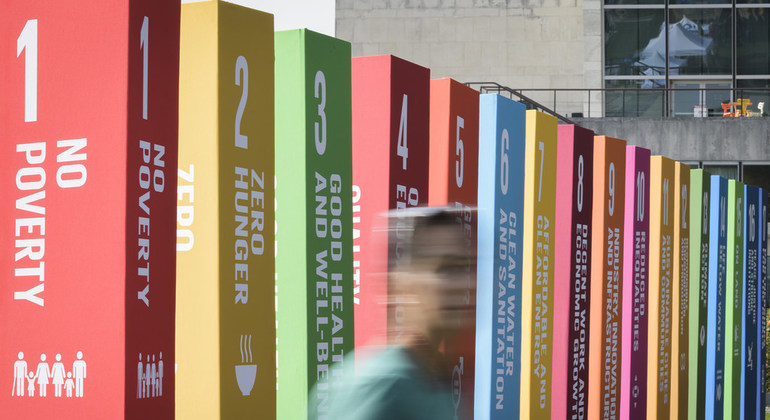The two-day summit, one of the five high-level summits and meetings taking place during the opening week of the 74th session of the UN General Assembly, will allow leaders from government, business and other sectors to identify specific actions on the road to 2030.
Mr. Guterres reiterated some of the many aims from the Agenda – such as an end to extreme poverty and hunger, a low carbon economy, peaceful and just societies, and human rights for all – and welcomed the progress being made globally, with governments beginning to integrate the SDGs into their national plans and strategies.
However, he warned that the world is, so far, set to miss the deadline, citing deadly conflicts, the climate crisis, gender-based violence, and persistent inequality: “half the wealth around the world is held by people who could fit around a conference table”, Mr. Guterres told the delegates, “and, at the current pace, almost 500 million people could remain in extreme poverty by 2030”.
Indicating the direction that discussions will follow over the two days, the UN chief called for global action in areas such as conflict prevention, development finance, and the climate crisis; local action to make a difference in people’s lives; and building up partnerships that include civil society, media, the private sector, academia and others.
Gearing up for a decade of action
The incoming President of the General Assembly, Tijjani Muhammed-Bande, told the delegates that he was encouraged by the discussion regarding SDGs, that have taken place since the launch of the 2030 Agenda four years ago, and welcomed the adoption of the Summit’s political declaration, “Gearing up for a Decade of Action and Delivery for Sustainable Development”.
The Declaration calls for enhanced action to achieve the Goals, with Member States pledging to mobilize financing, enhance national implementation and strengthen institutions to achieve the sustainable development objectives of the Agenda, and leave no one behind.
Specific commitments, or “acceleration actions”, include Finland’s pledge to achieve carbon neutrality by 2035; the Maldives partnership with a number of companies to create a nationwide framework to deliver on many of the Goals; and Mexico’s pledge to provide access to the internet for everyone, including vulnerable communities.
“It is necessary to think of new ways of accelerating SDGs action for those that are still behind in meeting the goals”, said Mr Muhammed-Bande, “progress is largely uneven within and across countries and regions. We, therefore, must deepen partnerships to unlock the trillions of dollars needed to finance the SDGs”.
The General Assembly President expressed regret that many people, particularly in the poorest countries, and those locked in conflict and post-conflict situations, still live way below the poverty line, and urged a focus on poverty eradication and education, both of which, he said, are fundamental to achieving the goals and targets set out in the 2030 Agenda.
Echoing the Secretary-General, Mr Muhammed-Bande emphasized the importance of partnerships, and the involvement of marginalized groups: “Inclusion is key to enhancing international peace and security”, he told the meeting, “promoting the rule of law and human rights, as well as building effective, accountable and inclusive institutions at all levels”.



